2.2: Das Studium
- Page ID
- 105390
Aktivität 1. Was studieren Sie?
As you already learned in the last chapter, the verb studieren refers specifically to one’s area of study, his or her major. As a class collect as many words that you associate with the term das Studium.
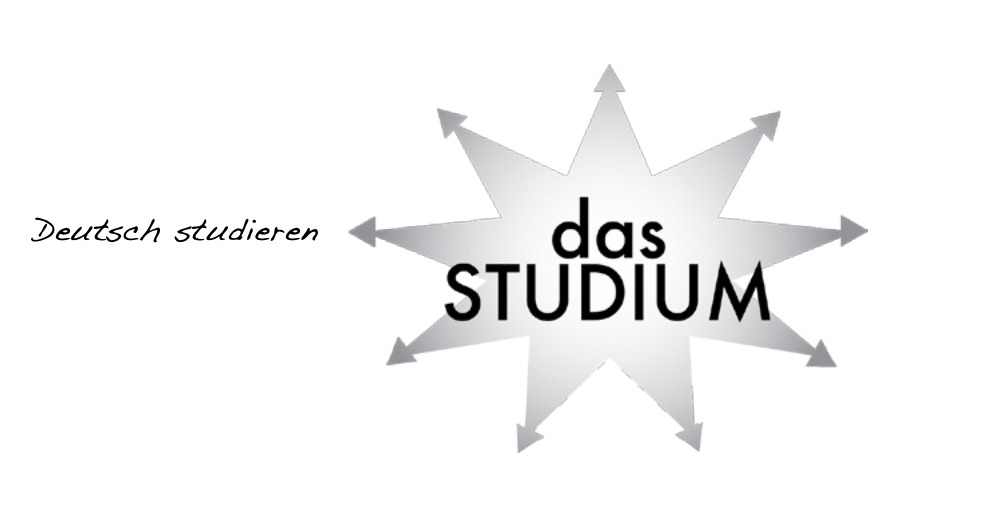
Aktivität 2. Evas Studium
What are some other important components of studying at the university: when you have classes, where you have classes, when you are finally done, and what exams you have to take … Watch Eva’s first video clip „Mein Studium”, and find out what she says about her studies. Check off the correct responses to the questions below. There may be more than one correct answer to each question!
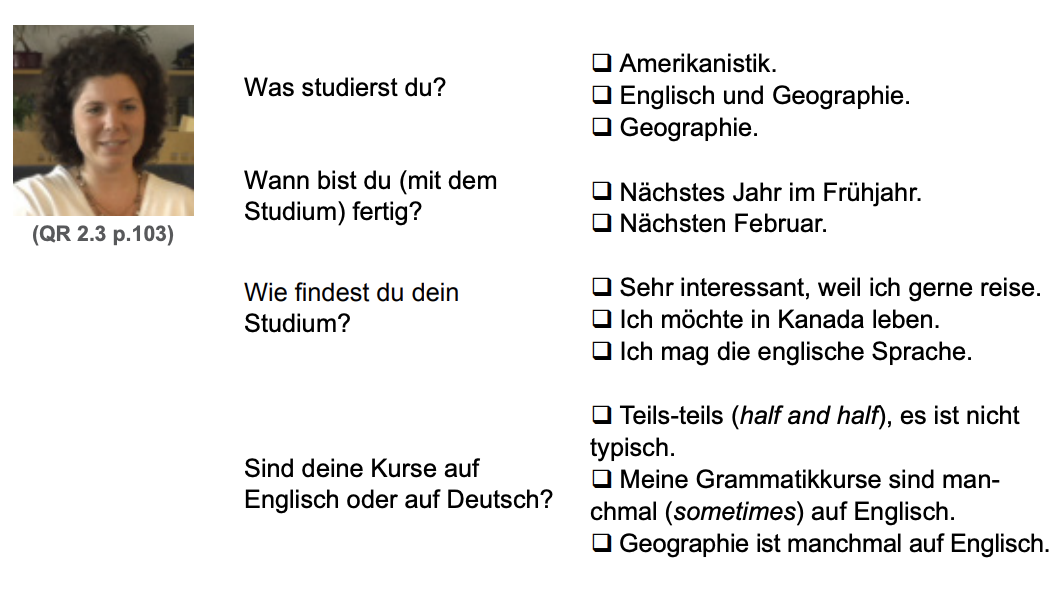
Aktivität 3. Wer studiert was?
Watch Adan’s, Sara’s and Sophia’s first clips „Mein Studium” and identify which details match which person. Connect the picture to the correct info-bubble.
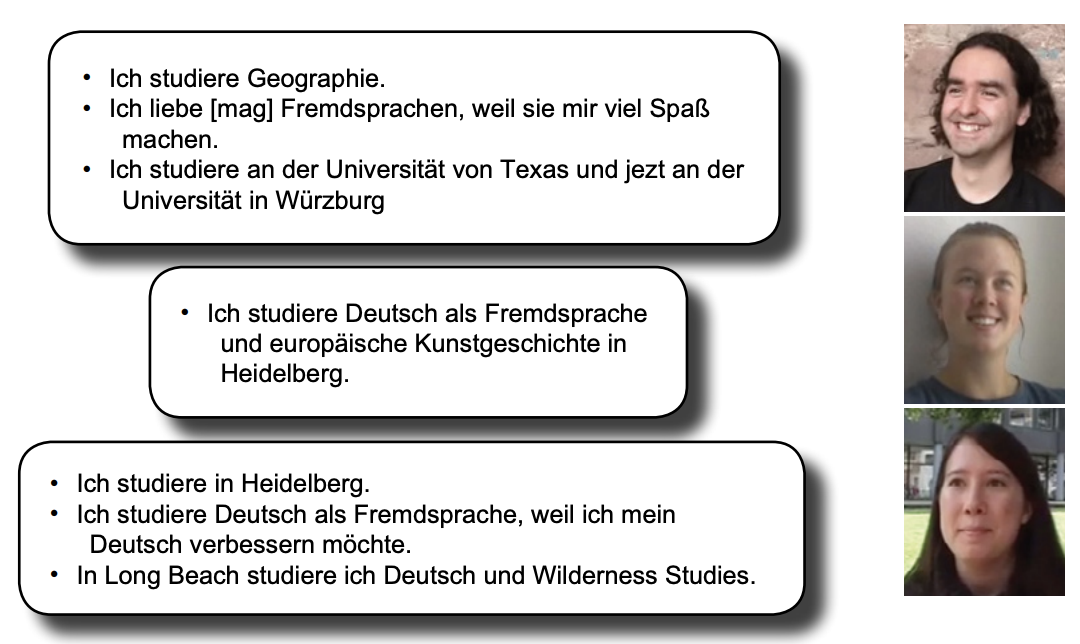
Aktivität 4. Berna und Jan: Mein Studium
Watch the first clips „Mein Studium” with Berna and Jan.
A. Watch the video twice. Take notes the first time. Answer the questions the second time you watch it.
What is their major? Where are they studying? How do they like their studies? You will need to listen to these clips several times in order to find out the answers! Feel free to take notes either in English or in German – or a combination of both!
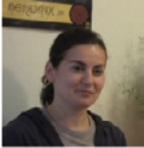 |
 |
|
| Was studiert sie/er? | ||
| Wo studiert sie/er? | ||
| Wie findet sie/er das Studium? |
B. Auf Deutsch!
How do you say the following phrases in German? Listen carefully to the expressions Berna and Jan use, and match up the English and German equivalents:

Aktivität 5. Hassans Studium
Watch Hassans clip „Mein Studium”. Circle the correct answers below.
a) Was studiert Hassan an UT?
Philosophie • Psychologie • Philharmonie
b) Was studiert Hassan nächstes Jahr?
Flora • Matura • Jura • Algebra
c) Wo studiert Hassan nächstes Jahr?
in New York • in York • in New Jersey • in Nürnberg
d) Was war Hassans Lieblingskurs?
Quatsch • Französisch • Deutsch
e) Warum will Hassan Jura studieren?
Geld • Ansehen • Menschen helfen
Zusatzfrage: Warum war Deutsch sein Lieblingskurs?
Aktivität 6. Haralds Studium
Listen to Harald’s description of his life as a student – „Mein Studium”. What did he like about his student experience? What did he dislike? What kind of a student was he?
A. Beim ersten Schauen
Watch the clip and identify the Stimmung (atmosphere, mood) in Harald’s narrative. Does he have fond or unhappy memories? How can you tell? Take notes on words that support your claim.
| Stimmung | Beweise (evidence) aus dem Text |
| Harald ist nostalgisch; er war sehr gerne Student. | |
| Harald ist sehr glücklich, dass er nicht mehr Student ist; er hasste das Studentenleben. |
B. Beim zweiten Schauen
Watch the video clip a second time, and listen for the characteristics Harald relates about his life as a student. What details does he provide about these characteristics?
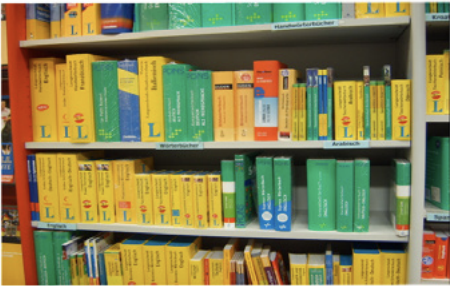
| Charakteristiken | Details |
| das Unileben Anwesenheit (attendance) die (Uhr-)Zeiten | Bücher, Literatur, Musik |
| Hauptfach | |
| Dauer (length) | |
| des Studiums | |
| Notizen machen | |
| Anwesenheit (attendance) | |
| die Unibibliothek | |
| die (Uhr-)Zeiten |
What joke does the interviewer completely miss towards the end?
Aktivität 7. Ihr Studium
To what extent are Harald’s memories similiar to your current experience?
A. Answer the questions below
1. Was ist das Wichtigste am Unileben für Sie?
• das Studium
• lernen
• mein Deutschkurs
• Parties
• meine Freunde
• die Wohngemeinschaft
_________________________________________________________________________ _________________________________________________________________________
2. Was studieren Sie?
_________________________________________________________________________
3. Wie lange dauert Ihr Studium?
• Noch ein Jahr.
• Noch zwei Jahre.
• Wer weiß?
4. Machen Sie sorgfältige Notizen in der Vorlesung?
• JA! Natürlich!
• Nein.
5. Sind Sie immer im Unterricht oder fehlen Sie ab und zu?
• Ich bin immer im Unterricht.
• Ich fehle ab und zu, weil ich krank bin.
• Ich fehle ab und zu, weil ich verschlafe.
• Ich fehle manchmal, weil ich gern auf Partys gehe.
6. Gehen Sie in die Bibliothek? Wenn ja, was machen Sie dort? Wenn nein, warum nicht? _________________________________________________________________________ _________________________________________________________________________
7. Wann stehen Sie auf, essen Sie zu Mittag, gehen Sie ins Bett?
_________________________________________________________________________ _________________________________________________________________________ _________________________________________________________________________ _________________________________________________________________________ _________________________________________________________________________
B. Compare your answers with two classmates
Are your experiences and habits the same or do they differ?
Nützliche Ausdrücke
Ich studiere an einer Universität/Ich lerne an einem Gymnasium.
Ich studiere __________________.
Ich mag mein Studium.
Ich hasse mein Studium.
Ich mag Fremdsprachen (zum Beispiel Deutsch, Englisch, Französisch).
Mein Studium macht sehr viel Arbeit.
Mein Studium ist zu einfach (easy) für mich.
Ich möchte ewig (forever) Student bleiben.
Ich finde meine Kurse meistens sehr interessant.
Meine Lehrer und Kurse sind ziemlich langweilig.
Für mich ist _____________________ am wichtigsten.
| Student 1 | Student 2 |
C. Tell the class about your experiences, focusing on one or more of the topics mentioned in (A) and (B).
Have someone take notes and create a class chart. Who share similar experiences and who breaks the ranks (aus der Reihe tanzen: Er/Sie tanzt aus der Reihe)?
| 1. _____________ Studenten finden ihre Kurse sehr interessant. | 2. _____________ Studenten finden ihre Kurse ziemlich langweilig. | 3. _____________ Studenten finden manche (some) Kurse interessant. |
Aktivität 8. Meine Lieblingskurse
Watch Sophia’s video clip „Lieblingskurse” and circle the correct information she provides about courses she liked and courses she really didn’t like. There may be more than one correct answer in each sentence!
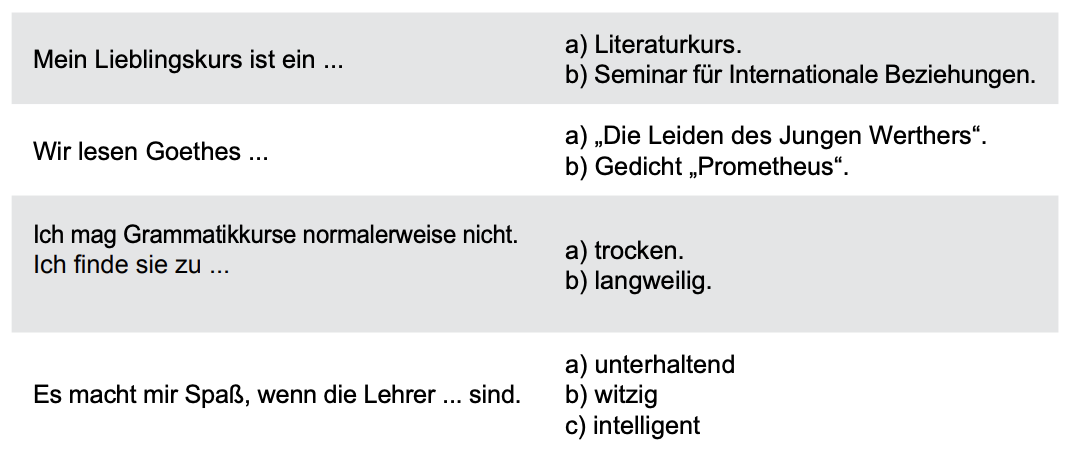
Aktivität 9. Weitere Lieblingskurse ... oder auch nicht
Watch the „Lieblingskurse” videoclips by Berna, Eva, Jan, Adan, Erin and Sara, and identify their most and least favorite courses, as well as the reasons they give for liking/disliking these courses.
A. Indicate in the lines after each course, whose favorite it is.
1. Phonetik und Klettern (climbing), weil sie anders sind als meine Kurse [zu Hause] _____________________
2. Kultur/Literatur/Film des 20. Jahrhunderts _____________________
3. Literaturkurse (die mit Büchern und Romanen zu tun haben) _____________________
4. Französisch (weil der Lehrer einfach Spitze war!) und Geographie __________________
5. Film und Kunst, wo ich mit anderen Studenten zusammen lernen und schreiben kann __________________
6. Englische Literaturwissenschaft (weil ich gerne lese) und Wirtschaftsgeographie (weil der Zusammenhang [connection] zwischen Wirtschaft und Geographie mich sehr interessiert) _____________________
B. Indicate in the lines after each course, who does not like it. Do you agree with their opinion?
1. Deutsch, weil wir gar nicht gesprochen haben (spoke). _____________________
2. Kurse, die nur am Text arbeiten. _____________________
3. Langweilige Kurse, wo man sinnlose Sachen machen muss. _____________________
4. Ökonomie, weil sie nur mit Nummern zu tun hat. _____________________
5. Mathematik finde ich sehr schlecht. _____________________
6. Physische Geographie (z.B. bodenbildende Prozesse), weil es zu viel Chemie ist. ___________
Aktivität 10. Positiv/Negativ
Identify the following expressions: which group is positive, which is negative? What courses are you taking this semester? Which expressions would apply to which of your courses?
| positiv/negativ | positiv/negativ |
|
mein Kurs ist langweilig der Professor hat keine Ahnung, was mich interessiert der Unterricht dauert zu lang die Bücher sind schwer zu verstehen es gibt zu viel sinnlose Arbeit der Lehrer ist zu streng |
mein Kurs ist sehr interessant der Professor weiß genau, was mich interessiert die Stunde ist viel zu schnell vorbei die Bücher sind einfach faszinierend wir schreiben eine bedeutungsvolle Seminararbeit die Professorin ist ausgezeichnet, ein Genie! |
A. Mein Lieblingskurs
Was ist Ihr Lieblingskurs? Warum finden Sie diesen Kurs so gut? Welchen Kurs finden Sie gar nicht gut? Warum?
Mathe • Biologie • Chemie Deutsch • Französisch • Spanisch • Rhetorik Informatik • Anthropologie • Musik • Psychologie Geschichte • Soziologie • Betriebswirtschaft • Archäologie Philosophie • Geographie • Astronomie • Kunstgeschichte Ökonomie • Englisch • Geologie • Griechisch Politologie • Linguistik • Physik
Before you talk about your favorite and least favorite course think about more reasons why you like or dislike a course.
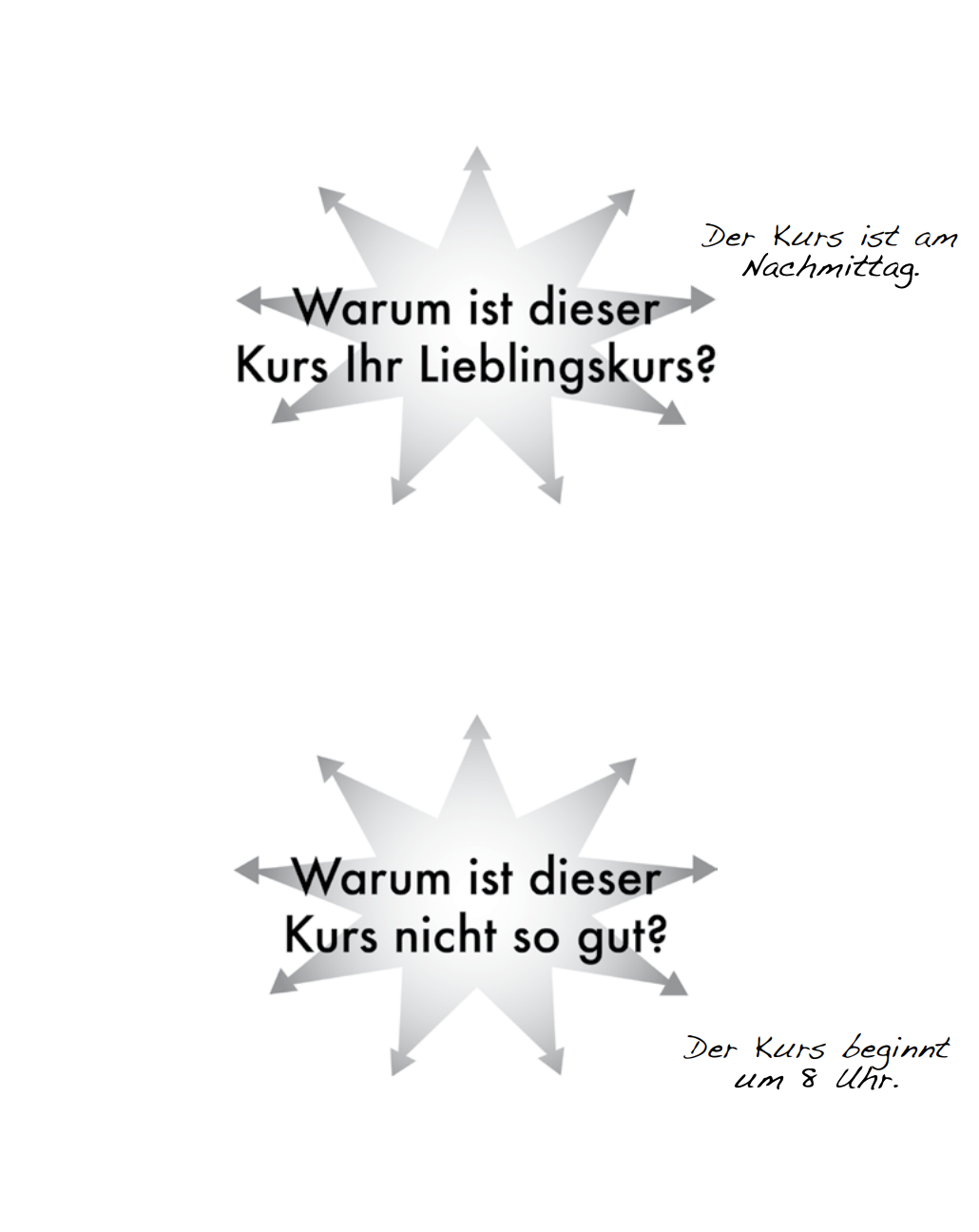
Mein Lieblingskurs ist _____________________________________,
| weil | ich gerne lese. |
| ich Fremdsprachen sehr interessant finde. | |
| wir viele Filme sehen |
Ich finde ________________________________________ uninteressant/gar nicht gut,
| weil | wir zu viel sinnlose Arbeit machen. |
| ich den Kurs zu schwierig finde. | |
|
der Kurs/der Lehrer zu langweilig ist. |
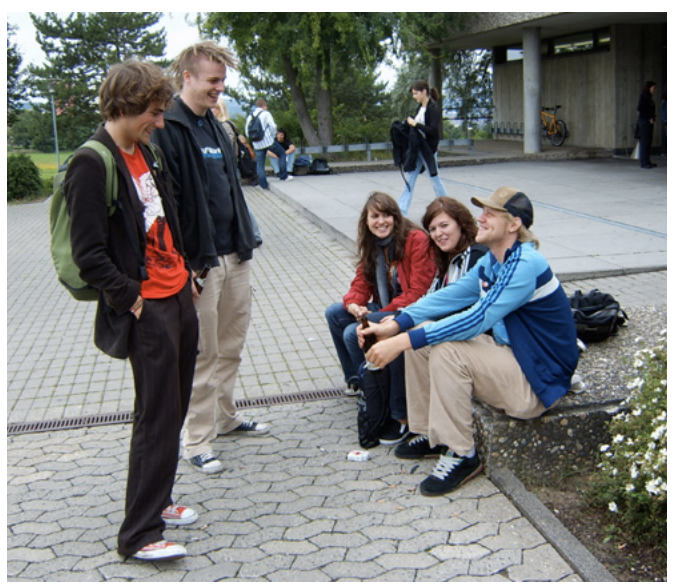
Aktivität 11. Ein kleines Interview
| A. | Student A: | Student B: |
| Was ist dein Lieblingskurs? | Mein Lieblingskurs ist __________. | |
| Warum? | Weil... | |
| Welchen Kurs findest du nicht so gut? | Ich finde _________ nicht so gut, weil... |
| NAME | ||
| Sein/ihr Lieblingskurs | ||
| weil... | ||
| Er/sie mag ______ nicht, | ||
| weil... |
Nota Bene: Instead of „Ich finde ...” you can use „Ich mag ...”. It is one of the modal verbs that you will learn in Kapitel 4 but it comes in handy when expressing likes and dislikes.
B. Ein kleiner Bericht
Write a short description about each of your interviews. Tell the class 1) who they are, 2) what their favorite course is, and why, and 3) what their least favorite course is.
Beispiel: Das ist ____________________. Sein/Ihr Chemiekurs ist ziemlich langweilig, weil der Lehrer zu streng ist. ________________________________________________________ ________________________________________________________ ________________________________________________________ ________________________________________________________ ________________________________________________________ ________________________________________________________
Aktivität 12. Wann haben sie Unterricht?
When are Hassan’s, Eva’s and Jan’s classes? Watch their clips „Im Unterricht” and select the correct answers from the choices provided. It usually helps with listening comprehension to read the text provided below before you actually watch the video clips!
| Ich hatte |
jeden Tag jeden Montag jeden Donnerstag |
Unterricht. |
| Wagner ist das |
Politologie Philharmonie Philosophie |
Gebäude |
| Dreimal die Woche beginnen die Kurse |
um 8 Uhr gegen Mittag. |
|
| Sie enden |
gegen 2-3 Uhr am Nachmittag. erst spät am Abend. |
|
| Freitags habe ich |
nur zwei Kurse. leider (unfortunately) viele Kurse. |
|
| Meistens habe ich |
morgens nachmittags |
Unterricht |
| Die Kurse fangen |
um 9 Uhr an. zwischen 2 und 3 Uhr an |
Zum Nachdenken:
• What do you think the difference is between „um 9 Uhr“ and „gegen 9 Uhr“? Hint: one is precise („at“), the other is approximate („around“).
• Telling time in German is often referred to as „military time.“ That is actually incorrect. While German formal time is expressed on a 24- hour basis (e.g., „It is 18 hour 22 minutes“ for 18:22), nobody would say 0 – 600 (oh-sixhundred) for 6 am.
Aktivität 13. Sara
When does Sara have class while she is in Würzburg during her summer Study Abroad program? Watch her clip titled „Im Unterricht“. Check the richtig (true) and falsch (false) boxes below.
| richtig | falsch | |
| a) Sara hat jeden Tag Unterricht. | R | F |
| b) Sara hat nur zwei Tage pro Woche Unterricht. | R | F |
| c) Sara hat am Dienstag, am Mittwoch und am Donnerstag Unterricht. | R | F |
| d) Ihre Kurse beginnen um acht Uhr. | R | F |
| e) Am Dienstag hat Sara einen Ökonomiekurs. | R | F |
| f) Am Donnerstag hat Sara einen Deutschkurs. | R | F |
Aktivität 14. Ihr Studium
Wann haben Sie Unterricht (Vorlesungen/Seminare)? Wann hat ihr Partner/ihre Partnerin Unterricht? First, fill out your own course schedule, then ask a classmate about his/her schedule. Use these helpful phrases to describe your and your partner’s schedules in the following activities.
um Viertel vor acht • von halb zehn bis zwölf • um ein Uhr • kurz nach halb drei • nie jeden Tag um neun Uhr • um Viertel nach fünf • zehn (Minuten) nach elf von zwei bis vier Uhr • von fünf Minuten vor vier bis Viertel nach sechs nachmittags • morgens • gegen Mittag • gegen sechs Uhr • am Abend • am nächsten Tag zweimal am Tag • jeden Tag • oft • selten
A. Meine Kurse dieses Semester
Fill in the table with the courses you have each day.
Zum Beispiel:
| Montag | Dienstag |
| Deutsch 8-9 | 8:30-10 |
Table:
| Montag | Dienstag | Mittwoch | Donnerstag | Freitag |
B. Und Ihr/e PartnerIn?
Ask a classmate what his/her schedule is like, using the questions and possible answer prompts below. Naturally, you need to change the information (e.g., day, course) to reflect your own schedule ☺.
am Montag
am Dienstag
Welche Vorlesungen/Seminare hast du am Mittwoch ?
am Donnerstag
am Freitag
Mögliche Antworten:
• Am Montag um 9.30 (neun Uhr dreißig/halb zehn) habe ich ______________.
• Mein ___________________________________ ist jeden Tag von 11 bis 12.
• Ich habe am Dienstag von 11 bis 12.15 (elf bis Viertel nach zwölf) _____________ .
• Am Freitag habe ich keine Vorlesungen oder Seminare.
Der Stundenplan meines Partners: __________________________________
Table:
| Montag | Dienstag | Mittwoch | Donnerstag | Freitag |
Aktivität 15. Eine Verabredung
You are trying to set up an appointment with a classmate. You will need at least three hours during the week to watch a German movie and write a report for class. Compare your schedules and find a time when you can meet for the three hours. Write down your dialog, and feel free to use the following question and answer prompts. Your teacher might ask you to perform your discussion as a skit.
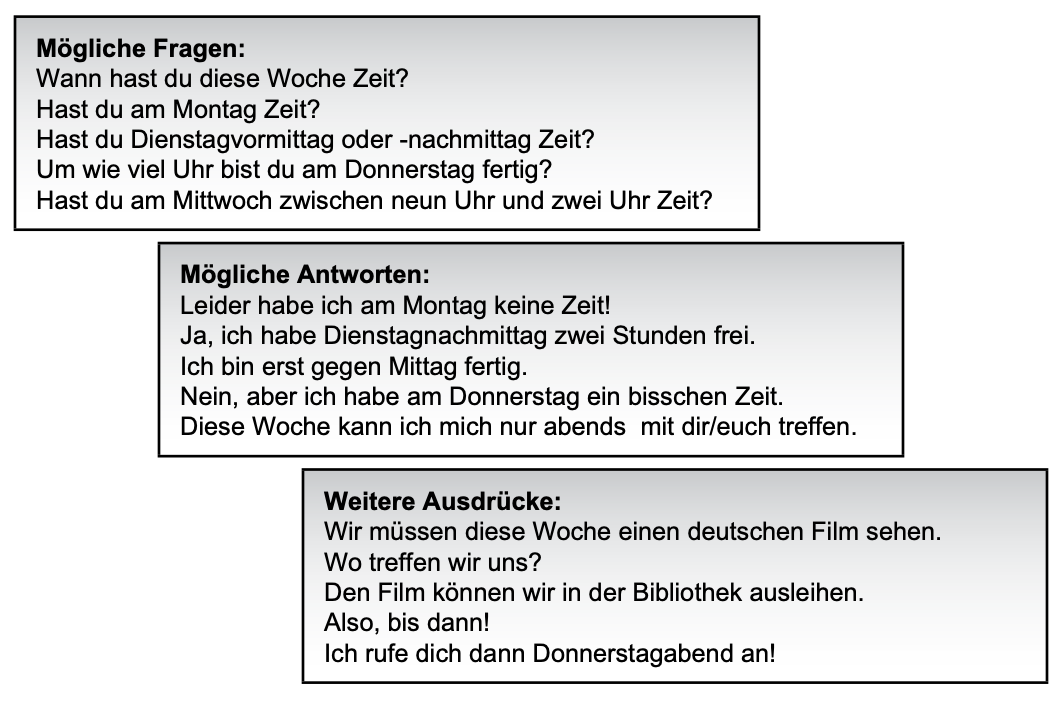
Der Dialog:
________________________________________________________________________ ________________________________________________________________________ ________________________________________________________________________ ________________________________________________________________________ ________________________________________________________________________ ________________________________________________________________________ ________________________________________________________________________ ________________________________________________________________________ ________________________________________________________________________ ________________________________________________________________________ ________________________________________________________________________ ________________________________________________________________________ ________________________________________________________________________
Aktivität 16. Sprache im Kontext: Katrins Studiengang
The Studiengang is one’s course of study, the required and elective courses one has to take to complete a degree. Watch Katrin’s video to learn more about different course types in Germany.
A. Listen to the clip. What is it about? What do you think Katrin talks about?
B. Listen to the clip again and check all the words that you hear.
Einführungskurse
Universität
Bargeld
Mensa
Grundstudium
Proseminar
Staat
Kursangebote
Hauptseminare
Masters
Aktivität 17. Studieren in Deutschland: Vorlesungverzeichnis in Würzburg
Have a look at the Vorlesungsverzeichnis (course schedules) for the College of Humanities & Social Sciences at the Uni Würzburg. Go online to search for „Vorlesungsverzeichnis & Würzburg” or enter http://www.uni-wuerzburg.de/fuer/stu...gsverzeichnis/ directly, and select Online-Vorlesungsverzeichnis. Then chose Philosophische Fakultät I from the list of possible areas of study.
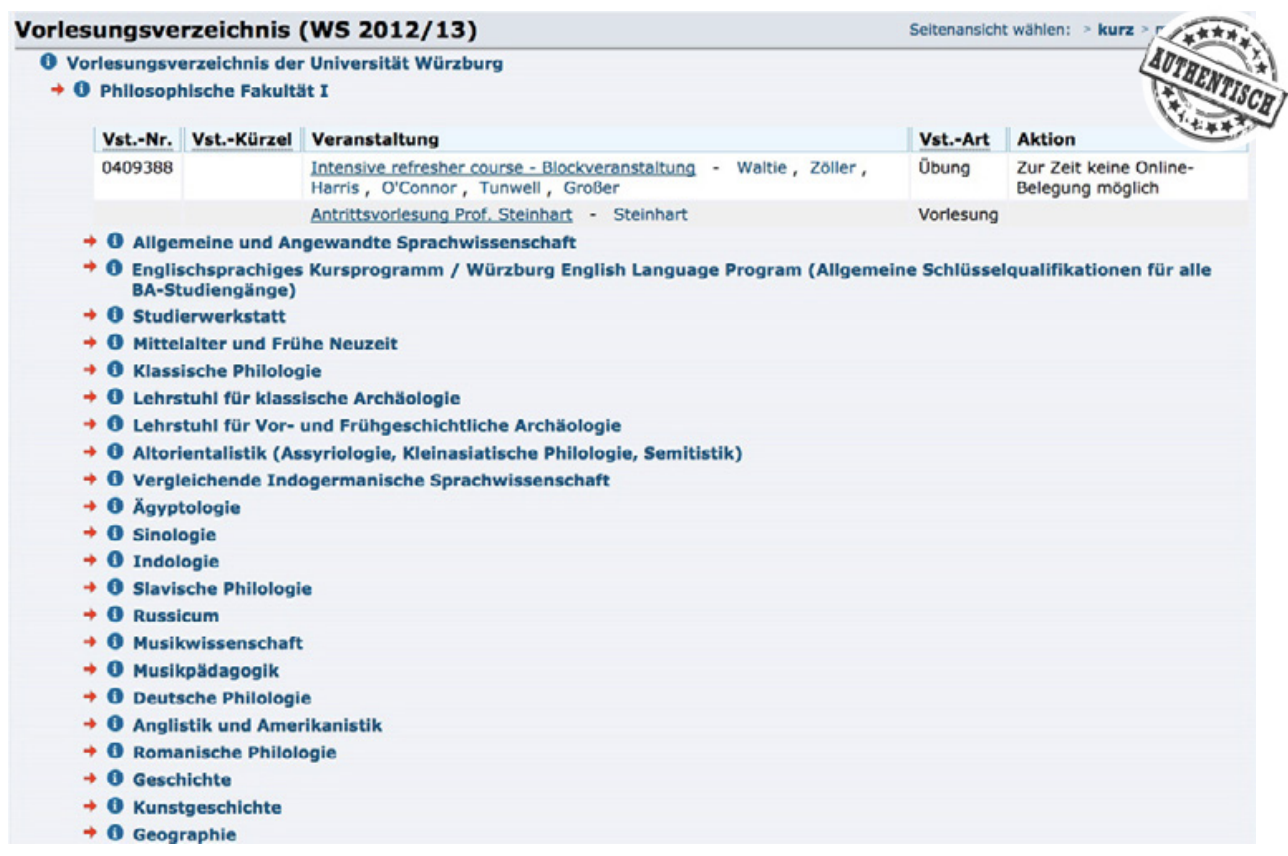
A. Die Lehrveranstaltung
Select a “department” that is particularly interesting to you. Then, pick two courses you might want to take. When you click on a specific class, you will see all the details about this class.
| Kurs 1 | Kurs 2 | |
| Name of the course | ||
| Name of the professor | ||
| When and where does the class meet? | ||
| What other details are provided (e.g., reading list, course assignments, etc.? |
Aktivität 18. Bernas und Jans Anforderungen
Watch Berna’s and Jan’s videos „Anforderungen”, and note what kinds of assignments each of them have to complete this semester. Pay attention to the phrases they use for talking about their studies.
Klausur • Examen • ein Forschungsprojekt Seminararbeiten • Essays • Referate Tests • Quiz • kurze Papers
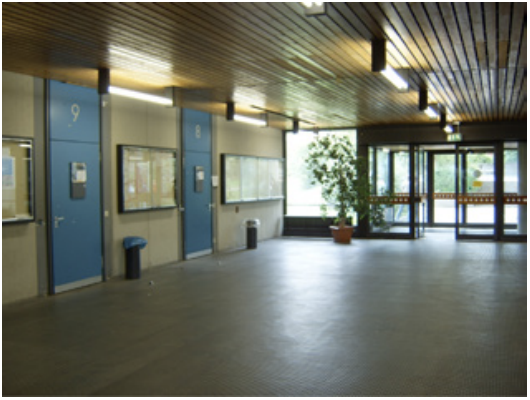
A. Berna
Hat Berna viele Klausuren und Seminarbeiten oder wenige?
Was muss sie im Laufe (during) des Semesters erledigen (here: complete)?
Was muss sie am Ende des Semesters machen?
B. Jan
Welche Anforderungen hat Jan dieses Semester in seinen Kursen (z.B. Tests, Hausarbeiten usw.)?
Muss er während (= im Laufe) des Semesters viel arbeiten?
C. Anforderungen
Re-listen to Berna and Jan’s clips and answer the following questions:
1. What do you think Berna’s „jede Menge“ means?
- lots of
- sometimes
2. Which of the following do you think mean “exams?“ Circle all that apply. How do you know?
- Examen
- Prüfungen
- Aufgaben
- Klausuren
- Hausarbeiten
3. Which of the following do you think mean “term paper?“ Circle all that apply. How do you know?
- Papier
- Semesterarbeit
- Hausarbeit
- Aufgabe
4. Match the correct German and English phrases in the following columns:
| im ganzen Semester verteilt | different things |
| ständig viel zu tun | spread out over the semester |
| verschiedene Sachen | constantly having a lot to do |
Aktivität 19. Guido erklärt alles ...
Just what is the difference between an Examen, a Klausur, a Seminararbeit or a Prüfung at German universities? Can you tell from Guido’s letter below? Be prepared that depending on whom you ask, the answer might be different; different universities use different assessments. Read the following E-Mail from Guido, in which he explains the difference between various types of tests he took at a Swiss university.
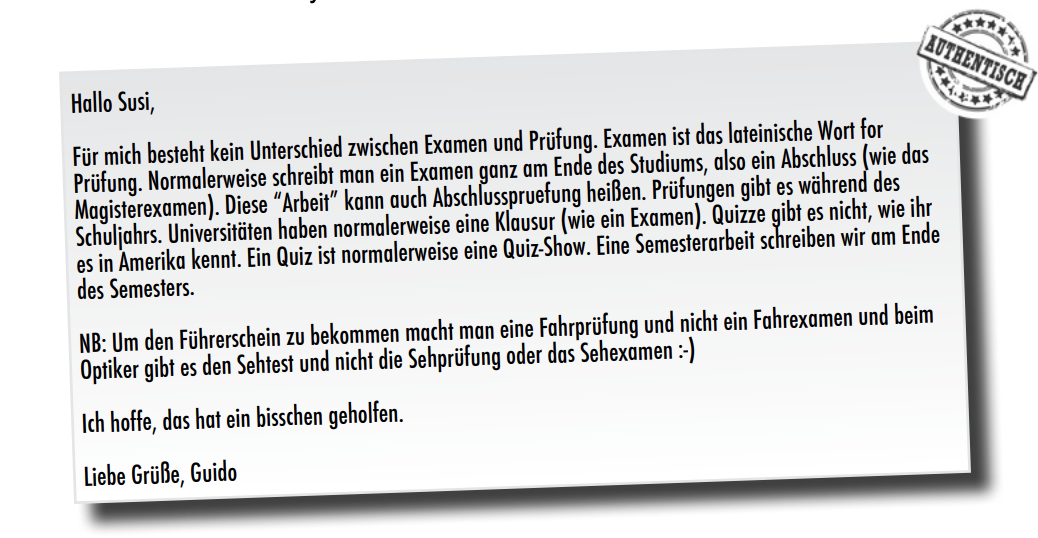
Aktivität 20. Ihre Anforderungen und die Anforder- ungen von Ihren Mitstudenten
A. Welche Anforderungen gibt es für Sie in diesem Semester?
Are you going to have a stressful exam period? Or a relatively easy one? Think of the courses you are taking this semester. What requirements do you have in those courses? Fill out the mind-maps and than finish the sentences.
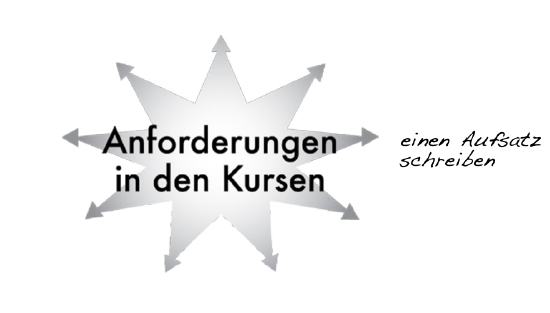
Merk’s Dir: „Es gibt ...” is th German way to say “There is/are ...” Someone might ask you „Gibt es viele Tests?” and you can reply by saying „Ja, es gibt drei Tests!”
| Dieses Semester | habe ich keine Prüfungen, nur ein Projekt. habe ich ______________________ Prüfungen: in ________________________, ________________________, ________________________ und _______________________. habe ich zu viele Prüfungen! |
| Am Ende des Semesters | muss ich eine Semesterarbeit für meinen _______________________ -kurs schreiben. muss ich zwei Semesterarbeiten schreiben. muss ich für jeden Kurs eine Semesterarbeit schreiben! |
| In meinem Deutschkurs | muss ich viele Essays, aber keine Examen schreiben. habe ich viel zu viele Hausaufgaben! kann ich ruhig schlafen; es gibt keine Anforderungen |
B. Welche Anforderungen haben Sie?
Ask one of your classmates what s/he is studying (i.e., major), what courses s/he is taking this semester, how s/he likes them, and what types of assignments s/he has this semester.
| Wie heißt du? | |
| Welche Kurse belegst du dieses Semester? | |
| Wie findest du deine Kurse? | |
| Was ist dein Lieblingskurs? Warum? | |
| Welche Anforderungen gibt es in deinem Lieblingskurs? | |
| Wieviel Zeit verbringst du mit Hausaufgaben? |
C. Ein bisschen Journalismus
Now write a brief paragraph about your interviewee: Studienfach, Universität, Kurse, wie er/sie seine/ihre Kurse findet, und seine/ihre Lieblingskurse. What kinds of Examen or Semesterarbeiten does this person have this semester?
Ein Bericht _________________________________ studiert _________________________________ an der Uni _______________________________________. Dieses Semester belegt er/sie Kurse: _________________________________________ , ___________________________________, und ________________________________ . Seine/ihre Kurse findet er/ sie ________________________________________________ . Sein/ihr Lieblingskurs ist _________________________________________________, weil _________________________________________________________________________ . Dieses Semester ___________________________________________________________
Survey: Now the reports are presented in class. Everyone needs to listen carefully and write down the Anforderungen of their peers as well as their Lieblingskurse. What is the most common Anforderung and what is the top Lieblingskurs?
| Anforderungen | Lieblingskurse |
| Beispiel: Deutsch | |
Now view Katrin’s Sprache im Kontext video clip „Anforderungen”
Katrin works at the Universität Würzburg. What types of Anforderungen does she mention? Katrin also mentions two types of courses: Einführungskurse and Seminare. Which Anforderungen are typically used in which course type?
Einführungskurse
Seminare
Are there differences in the way Katrin and Jan and Berna talk about Anforderungen? What questions would you have for Katrin (or Berna or Jan) in order to come to understand better the way students at German Universities are evaluated? How would you explain the different types of assignments you do to a visiting German, Austrian or Swiss friend?
Aktivität 21. Erfahrungsbericht
You agreed to help the international office by responding to e-mails and telling students about your university. Many of the students would like to know what it takes to get a degree at your university, how hard they would have to study, how much homework they would have, and whether they would still have a life... In order to prepare your response, first you need to collect some information from your classmates about their practices (you would not want to give somebody advice of this magnitude based only on your experience, would you?).
A. Interview a partner about his/her study practices (feel free to ask additional questions!):
Wie viele Kurse belegst du dieses Semester? Wann musst du zur Uni? Wie viele Stunden sitzt du im Hörsaal? Wann lernst du und wie viele Stunden? Arbeitest du neben dem Studium? Wie viele Stunden arbeitest du jede Woche? Wie viele Klausuren hast du dieses Semester? In welchem Kurs? Hast du Zeit für ein Hobby? ...?
Interviewnotizen:
B. With 2-3 classmates write an E-Mail to a student in Germany who contacted you about your University for further information.
How many courses do people typically take at your university? How many classes each day? How many hours do people study/do homework? How many exams do they have each semester? Do they work? Is there any time left for fun?
Make sure to proofread your entry afterwards so it’s comprehensible to your audience. In addition, make sure you start and end the E-Mail in a polite manner!
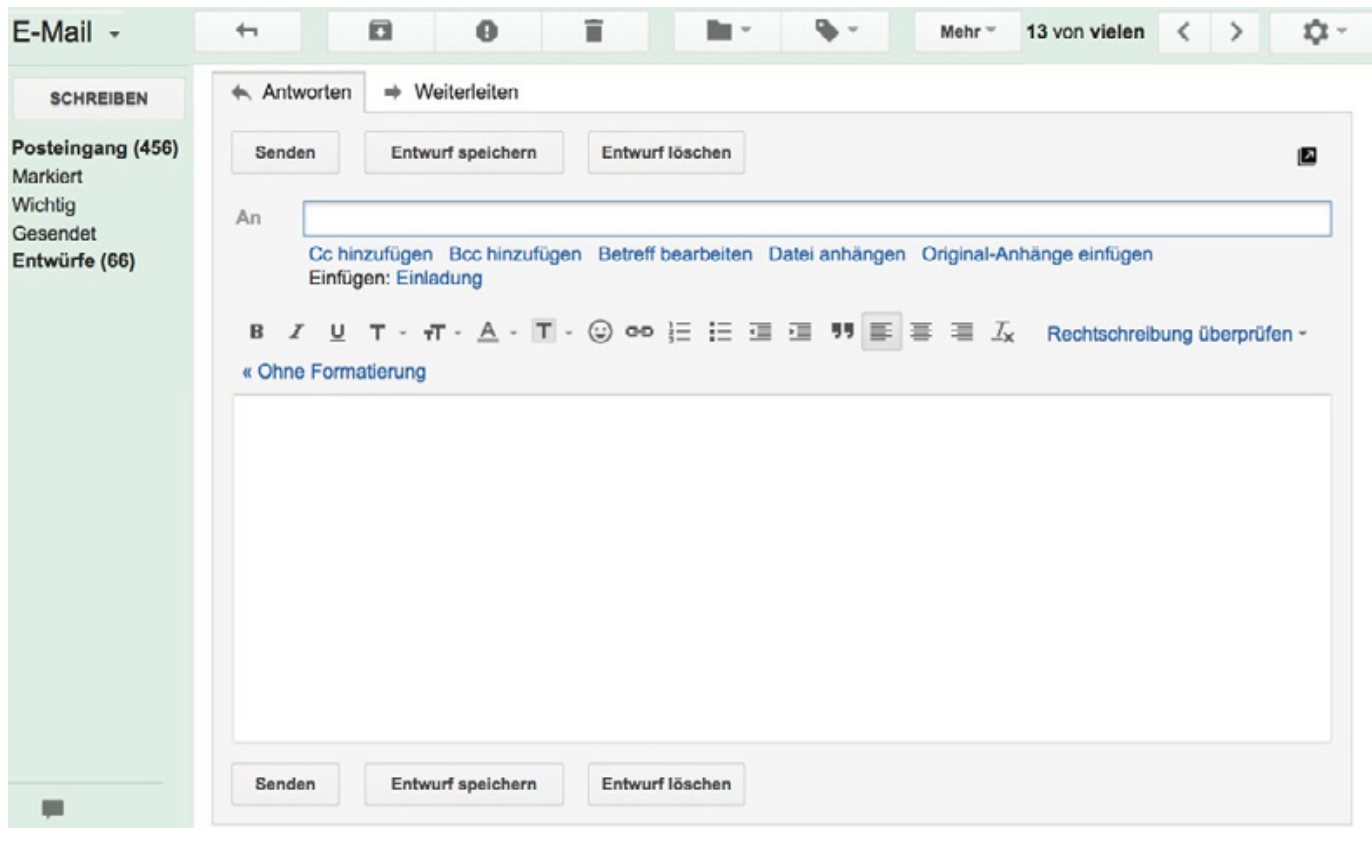
Studi-Tipp: When browsing the internet, make sure you set the language of the target website to German to practice navigating the world wide web auf Deutsch! Also, try and use your email account or social media (Facebook, Pinterest, etc.) in German.
Zum Nachdenken:
In Germany, the grading is a bit “backwards” for American learners. ‘1’ (eins) is sehr gut; ‘2’ (zwei) is gut; ‘3’ (drei) is befriedigend; ‘4’ is ausreichend; ‘5’ (fünf) is mangelhaft; and ‘6’ (sechs) is ungenügend. Austria has grades 1–5 (fünf is nicht ausreichend). Switzerland also has the 1–6 scale where 6 is the best grade (except in the Kanton Waadt, where it goes all the way to 10, 10 being the best). What would your grades have been like last semester according to the German grading system? What Durchschnittsnote (average grade, ca. GPA) would you have gotten?
Aktivität 22. Sprache im Kontext: Katrin und Vanessa: Im Ausland studieren
While it is true that most Germans speak English quite well, it is essential to learn a foreign language if you want to study abroad. Watch Katrin and Vanessa’s clips and answer the questions below.
A. Watch the clip and check all words that you hear.
| Katrin | Vanessa |
|
Ausland Englisch Anforderungen Noten Semester Tage Seminararbeit |
Doktorat Oktober Universität Sportwissenschaft Münster Studentenausweis Hauptwache |
B. Watch the clip again and answer the richtig–falsch questions below.
| richtig | falsch | richtig | falsch | ||
| 1) Katrin hat dreimal im Ausland studiert | 1) Vanessa beginnt im Oktober mit ihrem Doktorat. | ||||
| 2) Sie hat von 2004 bis 2005 in den USA studiert. | 2) Sie studiert Sportmedizin in München. | ||||
| 3) Sie hat Englisch unterrichtet. | 3) Ihre Uni ist in Mingen. | ||||
| 4) Das Studium in Deutschland ist nicht so streng geregelt wie in Amerika. | 4) Ihr Hauptfach ist Sportwissenschaft. |
C. Listen to the clips one more time and answer the questions below.
Fragen zu Katrins Video:
1. Wann hat Katrin in den USA studiert? ________________________________________________________________________
2. Wo hat Katrin studiert? ________________________________________________________________________
3. Was ist in Deutschland die wichtigste Anforderung? ________________________________________________________________________
Fragen zu Vanessas Video:
1. In welcher Stadt liegt Vanessas Universität? ________________________________________________________________________
2. Auf welches Fach will sich Vanessa spezialisieren? ________________________________________________________________________
3. Wo möchte Vanessa vielleicht arbeiten? ________________________________________________________________________
Zum Nachdenken:
What differences does Katrin mention about the American and German course requirements? What are the Vorteile (advantages) and Nachteile (disadvantages) of each system? Why do you think Vanessa is doing her Ph.D. in Germany (as opposed to the U.S., Canada or Mexico)?
Aktivität 23. Ein kleines Interview
Work with a partner and ask each other the following questions. Write down your partner’s answers. Ask follow-up questions whenever possible.
| Möchtest du einmal im Ausland studieren? Wo? | Notizen: |
| Findest du Fremdsprachen wichtig für dein Studium? Und für deine Karriere? Warum/ Warum nicht? | |
| Welche Fremdsprachen sprichst du schon? Welche möchtest du noch lernen? | |
| Sollten (should) – deiner Meinung nach (in your opinion) – alle Studenten eine Fremdsprache lernen? Wenn ja, warum? Wenn nein, warum nicht? | |
| ...? |
Aktivität 24. Das schwarze Brett
Very common in universities is the giant column in the middle of the hallway, with layer upon layer of student advertisements: students seeking books, lecture notes, bikes, others offering these or letting you know about a new adventure club. This is „das schwarze Brett”, the campus bulletin board still found at every German university. „Das schwarze Brett” is a gold-mine for the inexpensive furniture you need for your dorm room or the new conversation partner who will swap English lessons with you for German lessons. Take a look at the following advertisements students posted and find out what they were looking for or what they were trying to sell.
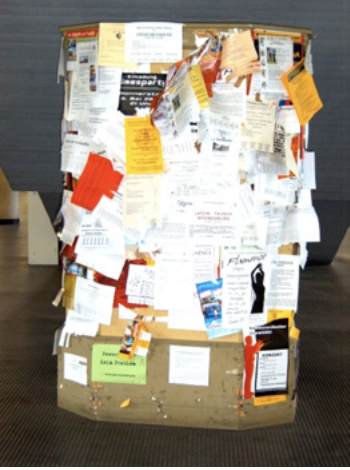
A. Anzeigen: verkaufen/suchen/anbieten/informieren.
Look at the ads the students put up on das schwarze Brett (see next page). Which ones are selling/offering something, which are seeking something? Which ones are just presenting information?
| advertisement number: | selling/seeking what? | |
| zu verkaufen: | ||
| suchen: | ||
| informieren: |
B. Wie sagt man?
Read the advertisements carefully and note important phrases and expressions the authors of these ads used. Wie sagt man auf Deutsch?
seeking = ____________________
wanted = ____________________
to trade = ____________________
subletting = ____________________
from (+ date) = ____________________
if you have questions, you can call us at ... = ____________________
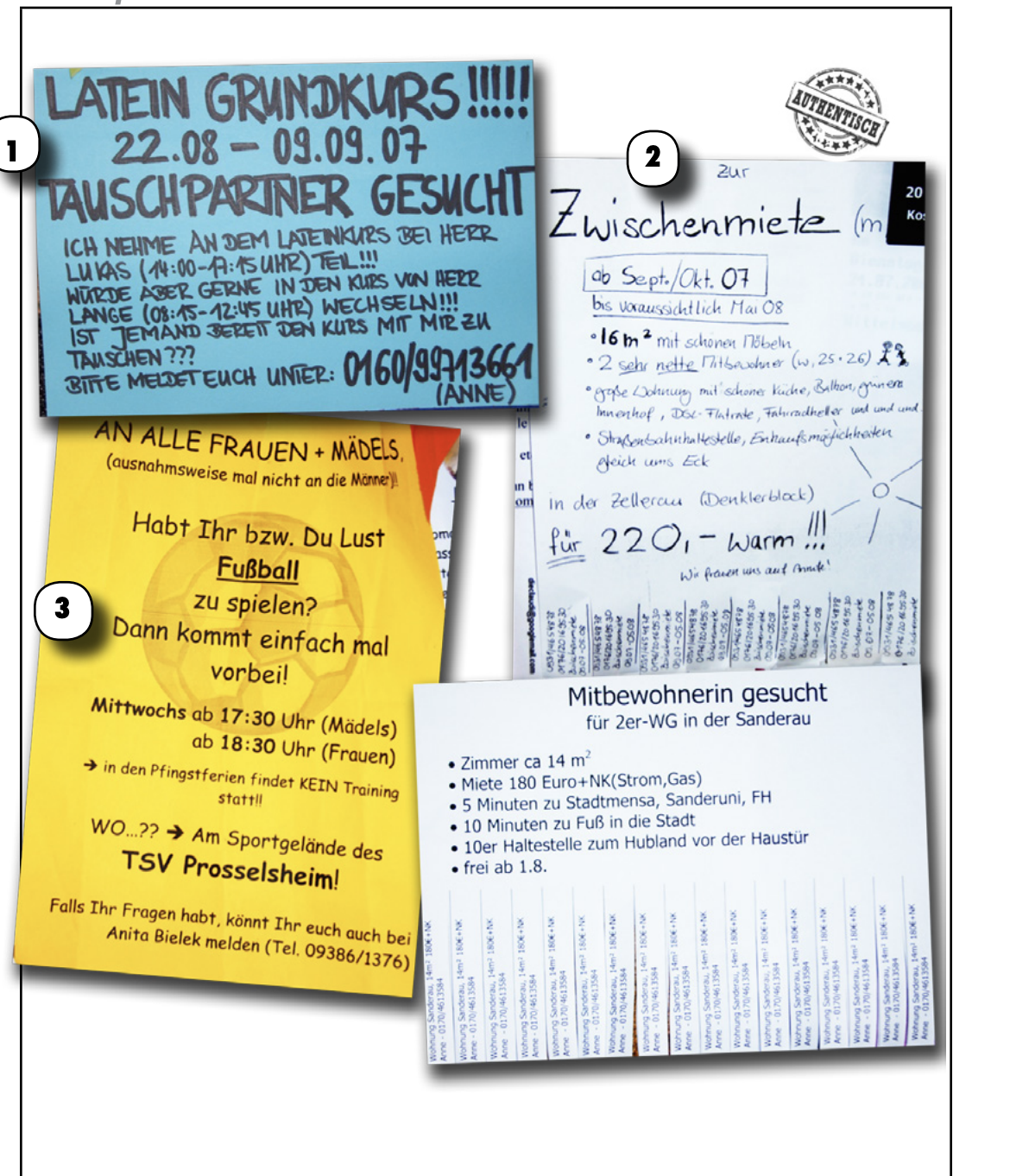
Zum Nachdenken: Looking at the language that the students used, what values are expressed? What is important in a room (e.g., lightness, air, heating?)? In a roommate?
C. Noch einmal lesen
Now it’s time to explore these ads a bit more deeply. Read 2 of the Anzeigen that look interesting to you, and fill in the table below.
| Anzeige 1 | Anzeige 2 | |
| Title/Name | ||
| Is this ad from someone offering a service or looking for one? | ||
| What is the service that is being offered or sought? | ||
| What is the contact information of the person who posted this ad? | ||
| What other information is provided that seems particularly useful? | ||
| What are 2-3 useful phrases in this ad? |
D. Antworten
Of the Anzeigen you just read, pick one to respond to. Write a script for a phone call you would make to respond to the author of the ad. Express your interest in what the person has to offer. Use as many of the useful phrases as you can from the ads you read. Make sure you include the information that is provided in the given advertisements.
E. Meine Anzeige
Unfortunately, the person tells you immediately (or calls you back to tell you) that whatever he/she had for sale is no longer available! Wie schade! Now you have to write your own advertisement seeking/selling what you need or have for sale. Make sure that you make your advertisement effective, funny, concise, with all the necessary information on the ad! Feel free to decorate it too – that always helps catch the reader’s eye!
Aktivität 25. Im Studentenwohnheim
Now you know a lot about the university in Germany, but you still need to know where to live and other important things you need to be aware of. Read the message Jackie received from her German friend, and answer the questions below.
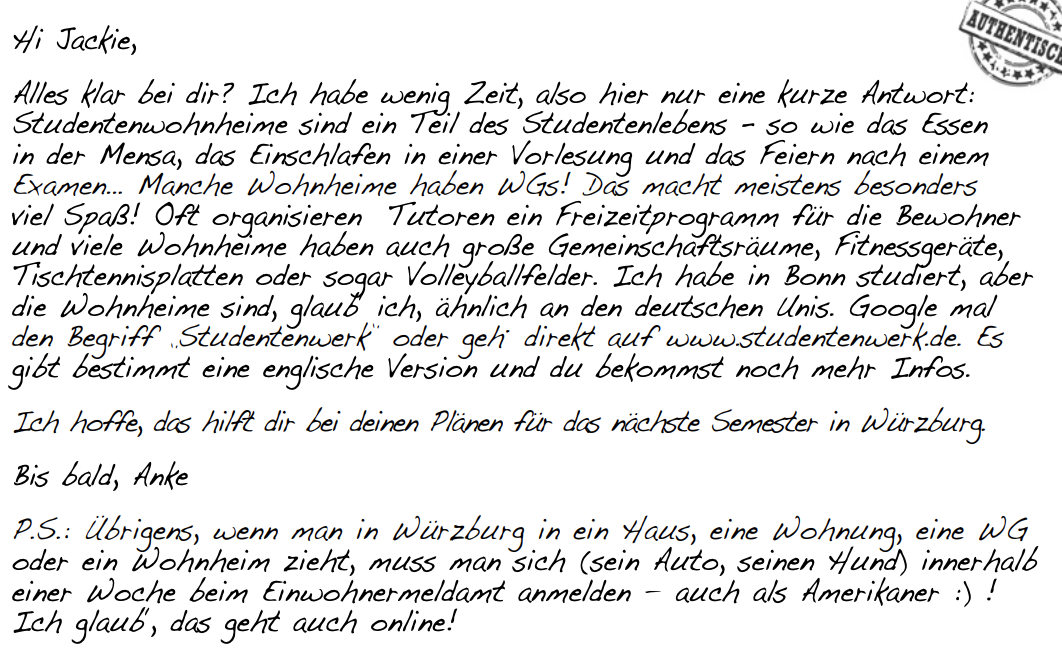
A. Wohnheime
1. What is a part of the Studentenleben in Anke’s opinion?
2. What kind of sport can you do at the dorms?
3. What do you think „WG“ means?
4. What does Anke suggest, where can Jackie get more information?
In Germany you are required to register at the local municipality once you move to a new place.
B. Meldepflicht
1. According to Anke´s postscript, who has to register at the local municipality?
2. When do you have to register?
3. What does Anke think, how can you register?
4. What do you think might be some reasons for requiring people to register?
5. Is there something similar people in your home state/country have to do?
6. Go to the following website: http://www.wuerzburg.de/de/buerger/b...sen/index.html (Look for Wohnungsbestätigung.pdf) You will find the form to register in Würzburg. What information do they require from you? What do you think about this law?
C. Haushaltspaket
Since you are an exchange student, and you will only be in Germany for one or two semesters, you don’t want to buy all the stuff you need for your apartment or dorm. Thankfully, the „Studentenwerk” (student union) offers a package with all the basic things you need. Source: http://www.studentenwerk-wuerzburg.de (search for “Studying and living in Würzburg” brochure)
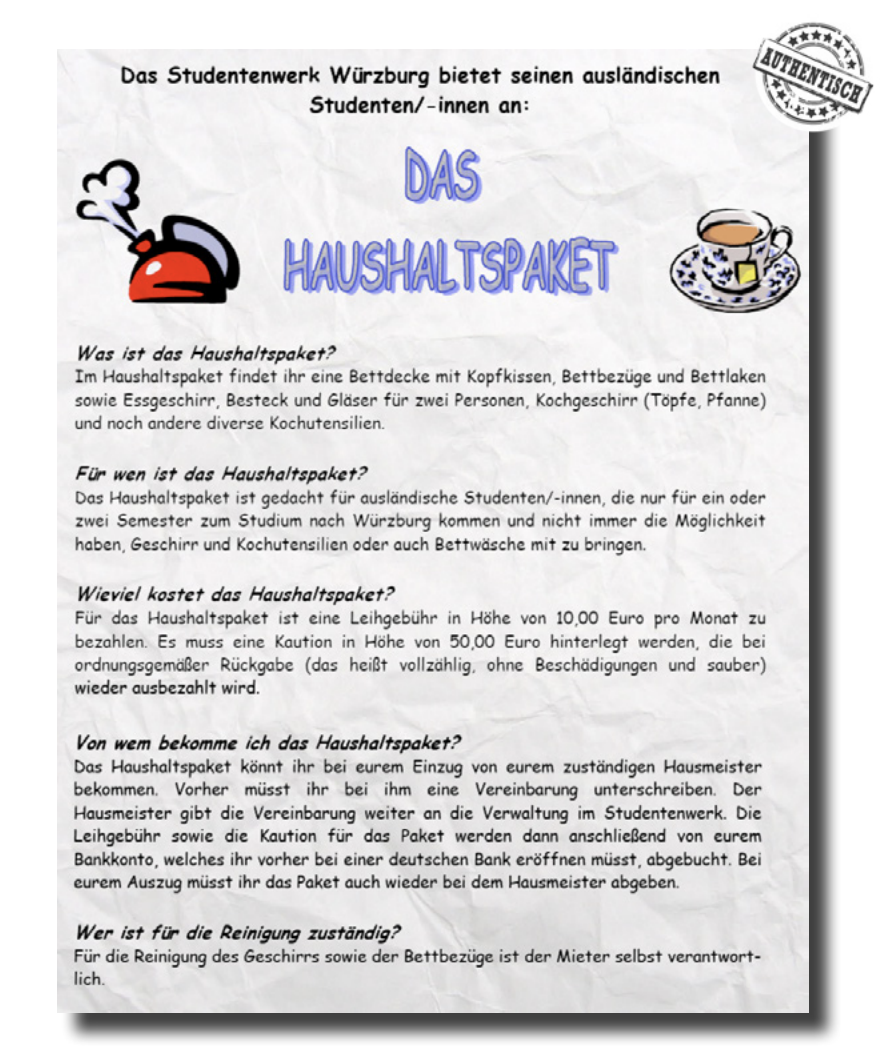
1. To whom are Haushaltspakete offered?
2. What things are included in the Haushaltspaket?
3. How much does the Haushaltspaket cost?
4. What is a Kaution?
5. Who is responsible for cleaning the items included in the Haushaltspaket?
6. What do you think is missing? What should also be included in the Haushaltspaket? Alternately, what is in the Haushaltspaket which you didn’t expect to see?
Aktivität 26. Im Studentenwohnheim
Knowing a foreign language can lead you to exciting and wonderful new places. While you are on a study abroad program, you are staying with a host family whose house you can see in the picture on the next page. Next to the labels for the different rooms and items in these rooms, write down what your host family has. Make sure that you use the correct accusative form (and with the correct gender!). We have already furnished the bathroom for you and bought you some essential toiletries as well! ☺
Beispiel:
Im Bad/Zimmer gibt es ... (+Akk.)
Note that we use „im” (a contraction of the preposition “in” and the dative article “dem“ ) for the masculine and neuter nouns and „in der” for the feminine nouns. When talking about rooms in our house only the kitchen is feminine and we use „in der”to say what we find in it.
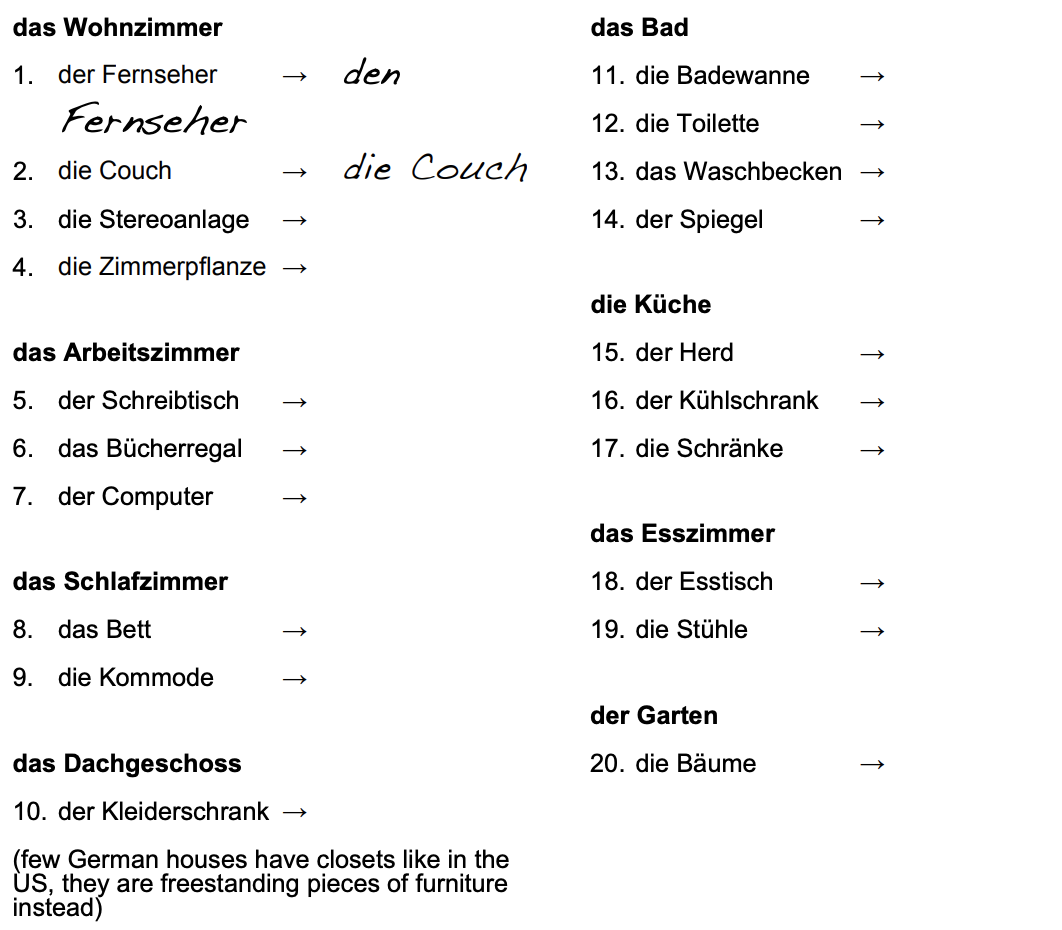
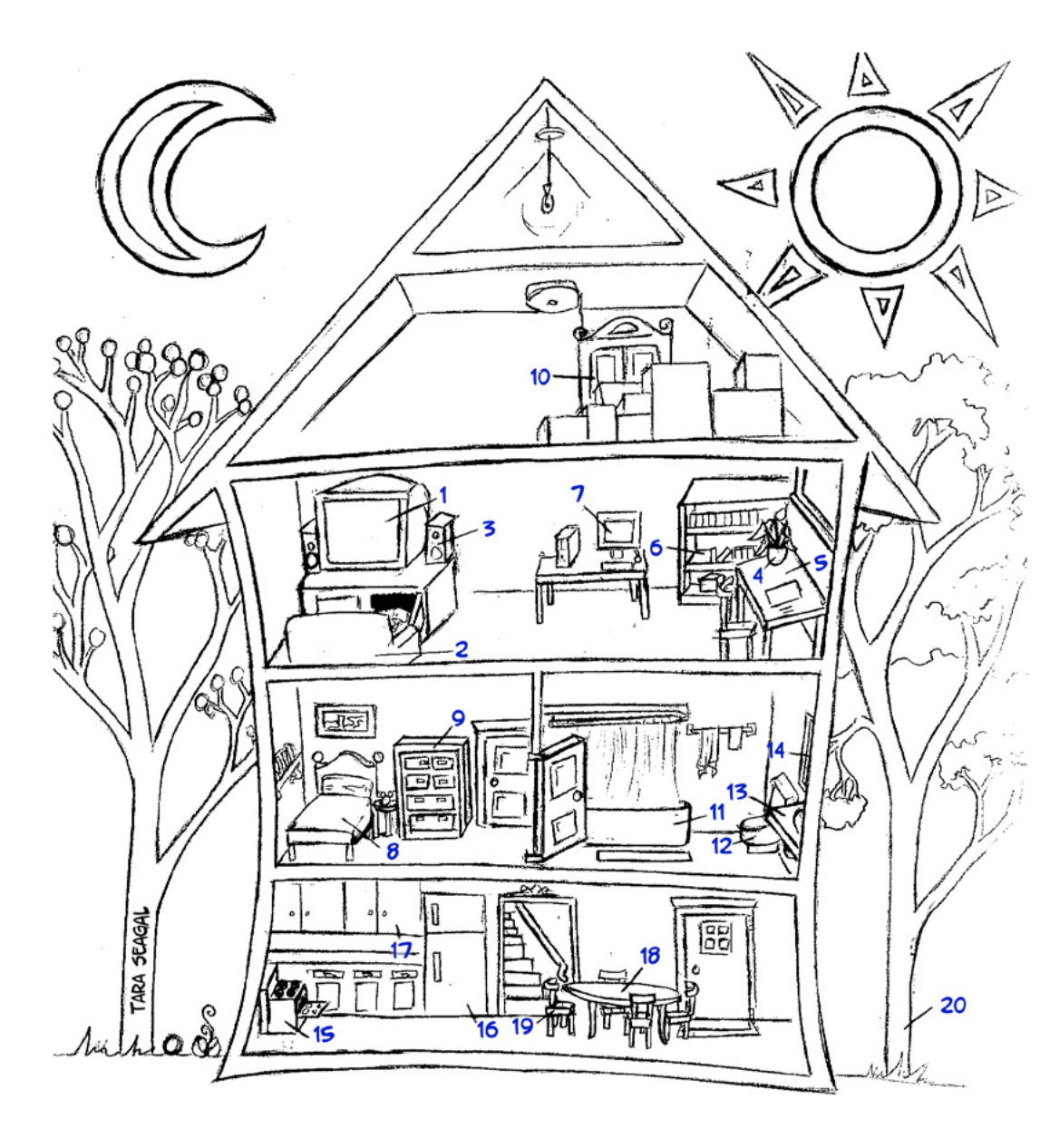
Aktivität 27. Sprache im Kontext: Bernas Wohnung
Watch Berna’s Sprache im Kontext video and identify what rooms she has in her house and what items she has in her own room. Where does she like to buy things for her house?
A. Listen to Berna and write down all the rooms she has in her house.
Sie hat ___________________________ (#) Zimmer in ihrem Haus.
B. Listen to the clip again and check all the things Berna has in her room.
In ihrem Zimmer hat sie …
- ein Bett mit ganz viel Bettzeug
- einen (Kleider-) Schrank
- einen Wecker
- einen Fernseher
- einen Computer
- einen Teppich
- einen Schreibtisch
- ein Telefon
- ein Poster an der Wand
- viele Postkarten und Photos an der Wand von Familie und Freunden
- ein Bücherregal mit ganz vielen Büchern dadrin (in it)
- eine Stehlampe (a tall standing lamp)
C. Listen to the clip a third time and answer the questions below.
Warum hat Berna drei Zimmer in ihrem Haus?
Auf welchem Möbelstück steht Bernas Computer?
Wo kaufen Sie Sachen für Ihr Zimmer? Warum?
Aktivität 28. Sprache im Kontext: Was hat Sara in ihrer Wohnung?
A. Saras Küche
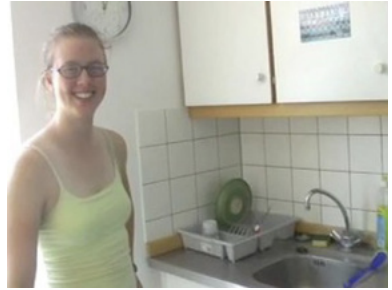
Watch and listen as Sara describes some of the items she has in her kitchen. Jot down some of the kitchen items she specifically mentions. Remember to include the accusative article for each word.
Beispiel: Sie hat einen Ofen
B. Saras Bad
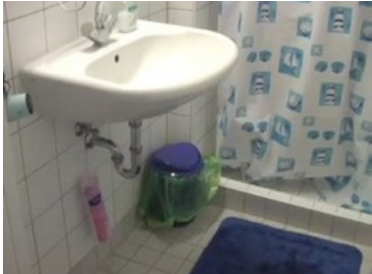
“I spy ...” Which items do you see in Sara’s bathroom(s)? Watch the video a second time if you need to and write down the German names of at least six items she mentions. Again, remember to include the accusative indefinite (eine, ein, einen) article for each word.
Beispiel: In Saras Badezimmer gibt es einen ...
Zum Nachdenken: Is there anything “different“ you notice about Sara’s dorm room compared to how American houses/apartments/dorms are set up? If yes, what did you notice? (Suggestions: think of color, use of space, light, look of furniture, etc.)
C. Saras Schlafzimmer
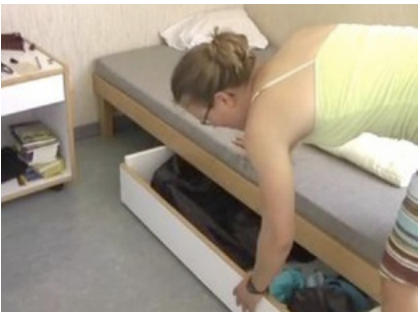
Watch as Sara talks about her dormroom in Würzburg. In the space below, list as many of the items she mentions as possible (there are 13 items all together), and use the correct accusative article for each noun!
Im Schlafzimmer hat Sara ...
Aktivität 29. Viel Spaß in der Wohnung!
Now that you’ve listed all of the bedroom items Sara mentions, find these 13 words in the word search below (the articles are omitted). The words may be forward or backward, horizontal, vertical or diagonal. This activity will help your spelling!
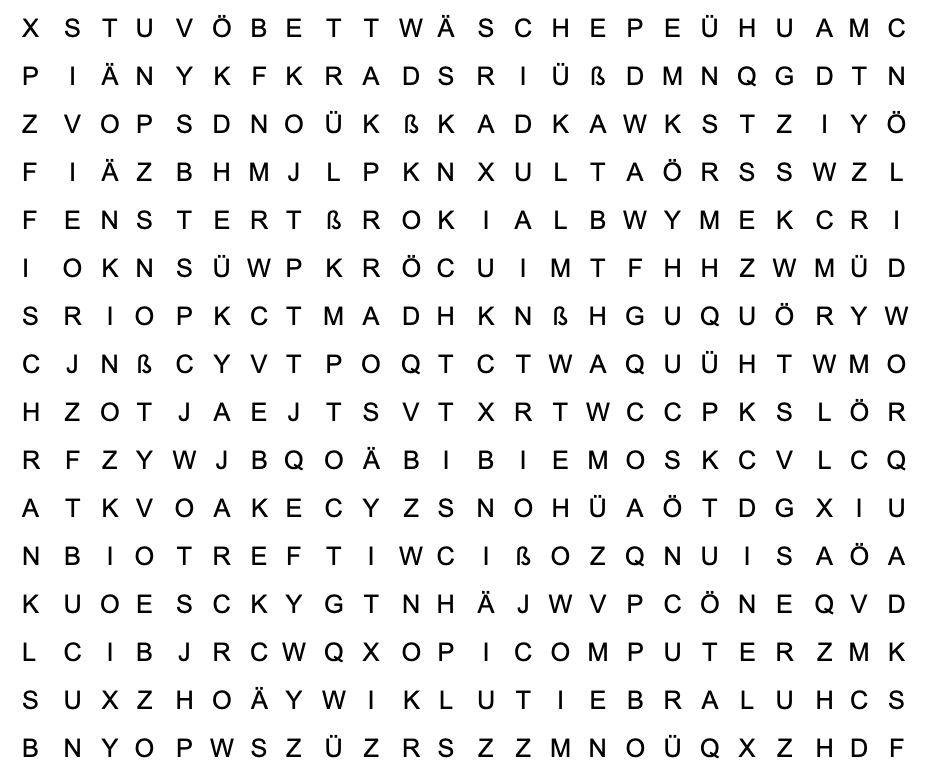
Aktivität 30. Mein Zimmer
Jetzt sind Sie dran! What do you have in your own room?
A. Make a list
Write all the items that you already have (haben; column 1), what you really need (brauchen; column 2) and what of these items you would really like to have (möchten; column 3). Let a classmate know what these items are. Make sure you use the correct direct object article (einen, ein, eine, den, das, die, die, etc.) to describe what you have, need or would really like!
Beispiel: Ich habe schon einen Tisch. Ich brauche noch einen Wecker. Und ich möchte sehr gerne einen großen Fernseher haben!
| Ich habe schon ... | Ich brauche ... | Ich möchte auch ... |
B. Go Shopping
Now that you know what it is that you don’t have (and would like), go shopping at a Swedish furniture store that is very popular in Germany: Gehen wir bei IKEA einkaufen! Sie haben ein Budget von 250 Euro: Welche Objekte auf Ihrer Liste oben wollen Sie kaufen? Sie finden die Preise hier: http://www.ikea.com/de/de/
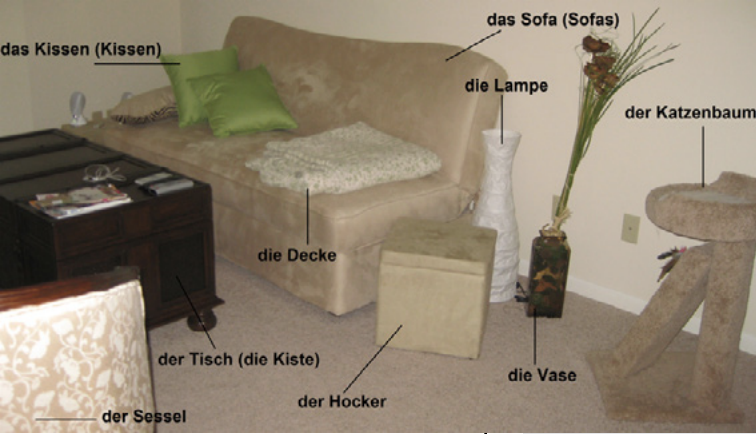
Oh nein! Es fehlen Pluralfomen. Wie lauten sie?
| Was ich kaufe: | Preis: |
Aktivität 31. Mein Traumhaus
On a sheet of paper draw a picture of your dream house. Label the different rooms and the items in each room. Remember, this is your dream home, so go wild and be creative! Label at least 15-20 items. Present your Traumhaus to the class! Remember: „es gibt“ and „ich habe“ take the accusative! Use the accusative form of the words in the boxes for exercise 27 (i.e., the words in the second column).
In meinem Traumhaus gibt es ein Schlafzimmer. Dort habe ich einen Schreibtisch, ein Bett, einen Computer und einen Stuhl.
Aktivität 32. Geschmäcker sind verschieden
Talk with a partner. First label the pictures with the correct words and articles. Then talk to your partner. Ask each other how you like the furniture pieces and electronics. Watch out for the accusative case!
Beispiel: S1: Wie findest du den Sessel? S2: Ich finde den Sessel unbequem.
Eigenschaften: praktisch • hässlich • klein • modern • alt schön • bequem • groβ • interessant elegant • unpraktisch • unbequem • genial altmodisch • ganz toll • super
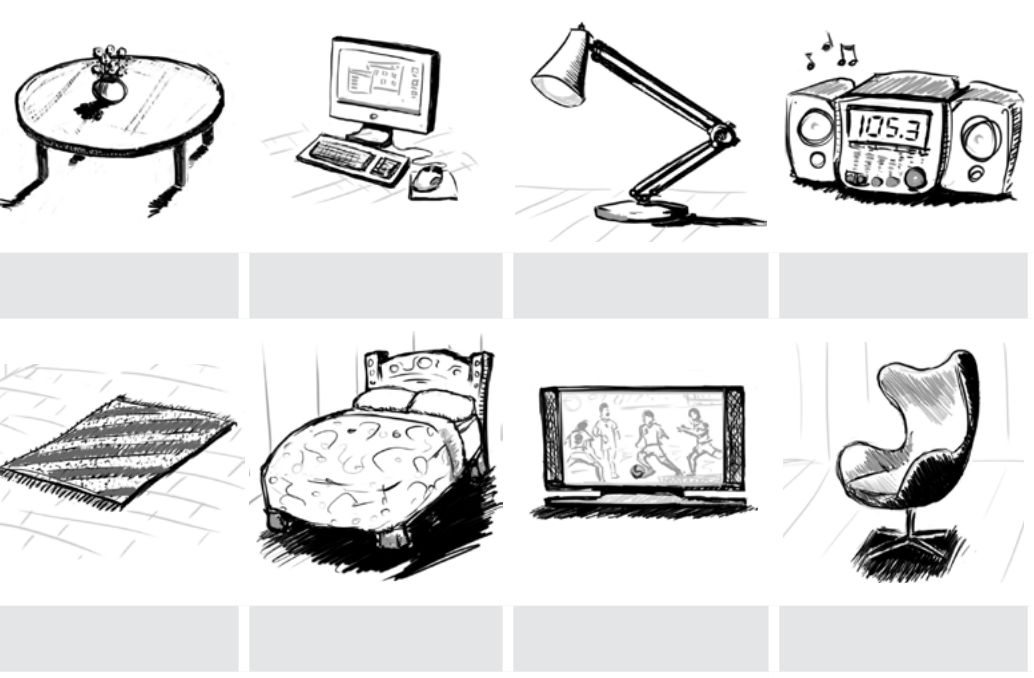
Aktivität 33. Sprache im Kontext: Tobe: Der Computer
In this video Tobe explains the computer and some of the accessories.
A. Watch the clip and circle all the words that you hear
Drucker • Tischplatte • Festplatte • Drücker • Scanner • Brenner • Bildschirm • Regenschirm Laptop • Maus • Haus • Tastatur • Taschenuhr • USB-Stick • Geschick • Geschirr
B. Watch the clip again and listen carefully to Tobe as he explains the different parts of his computer and accessories.
After watching try to match the words with the computer parts and accessories. Don’t forget to write down the correct article.
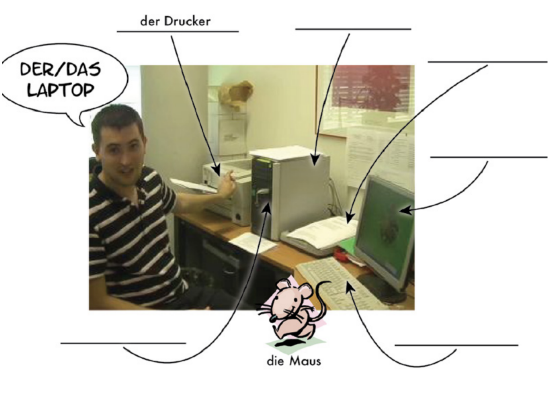
C. Der Scanner scannt ...
Watch Tobe’s clip again, and match the correct computer parts with the expressions Tobe uses with them.
| 1. die Festplatte | a. Hier muss man Papier einlegen, wenn man Dokumente ausdrucken möchte. |
| 2. die Maus | b. Hier kann man Dokumente einscannen und sie vom Blatt auf den Computer übertragen. |
| 3. der Drucker | c. Wo man den Computer ein- und ausschalten kann; hier kann man den USB-Stick anschließen. |
| 4. der Scanner | d. Was den Zeiger auf dem Bildschirm bewegt und womit man auf verschiedene Symbole klicken kann. |
Aktivität 34. Interviews: E-Mails schreiben: ja oder nein?
Although for many people, and in many instances computers make our lives much easier, there are some stressful aspects to e-mail as well. Listen to what Harald has to say about e-mails:
A. Watch Harald’s clip
Wie findet er E-Mails? Circle all that apply!
1. Er findet E-Mails toll.
2. Er schreibt jeden Tag ungefähr zwei Stunden lang E-Mails.
3. Er hasst die modernen Kommunikationsmethoden, wie E-Mail.
4. In einem Jahr verschwendet (waste) man ungefähr zwei Wochen mit E-Mails.
5. Er liest gern echte, altmodische Briefe.
6. Er ruft Leute sehr gern an.
B. Zum Nachdenken
Wie wichtig sind E-Mails und das Internet für Sie? Wie oft benutzen Sie solche sozialen Online-Plattformen (d.h. soziale Netzwerke) wie Facebook oder Twitter? Haben Sie Freunde aus den deutschsprachigen Ländern? Wenn ja, fragen Sie sie, welche Plattform sie am meisten benutzen. Benutzen Sie E-Mail anders als Ihre deutschen, österreichischen oder Schweizer Freunde?
Aktivität 35. Eine Internet-Umfrage
Are you really into the Internet?
A. Read the statements below and decide if they apply to you or not
| Ja | Nein | |
| 1. Ein guter, schneller Internetanschluss ist für mich sehr wichtig. | ||
| 2. Das Internet ist für mich wichtiger als Kaffee. | ||
| 3. Ich verbringe (spend) mehr als drei Stunden pro Tag im Internet. | ||
| 4. Mit meinen Freunden spreche ich nur per Facebook oder SMS. | ||
| 5. Ich checke meine E-Mails mindestens (at least) jede halbe Stunde. | ||
| 6. Wenn ich mit einem Freund spreche, lese ich SMS-Nachrichten im Handy | ||
| 7. Ich kriege mehr als 20-25 E-mails bzw. SMS-Nachrichten pro Tag |
B. Klassenumfrage
Use the statements above to create questions, and ask your peers whether the statements apply to them. If their answer is “yes,” have them initial your questionnaire. How many students answered positively to each of the questions? Is your class addicted to the Internet?
1. Ist ein guter, schneller Internetanschluss sehr wichtig für dich?
2. Ist das Internet für dich wichtiger als Kaffee?
3. _____________________________________________________________________
4. _____________________________________________________________________
5. _____________________________________________________________________
6. __________________________________________________________________
| Ja | Nein | |
| 1. Ein guter, schneller Internetanschluss ist für mich sehr wichtig. | ||
| 2. Das Internet ist für mich wichtiger als Kaffee. | ||
| 3. Ich verbringe (spend) mehr als drei Stunden pro Tag im Internet. | ||
| 4. Mit meinen Freunden spreche ich nur per Facebook oder SMS. | ||
| 5. Ich checke meine E-Mails mindestens (at least) jede halbe Stunde. | ||
| 6. Wenn ich mit einem Freund spreche, lese ich SMS-Nachrichten im Handy | ||
| 7. Ich kriege mehr als 20-25 E-mails bzw. SMS-Nachrichten pro Tag |
Aktivität 36. Ein Interview
Ask one of your classmates about his/her use of Technik (technology). You can use the questions below or pose your own questions. When you are done, present your findings to the rest of the class.
Wofür (for what) benutzt du den Computer?
Hast du ein Laptop oder einen Computer?
Magst du lieber PCs oder MACs?
Spielst du Videospiele? Wie oft? Wie viele Stunden pro Woche?
Hast du ein Lieblingsvideospielsystem (Xbox, Wii usw.)?
Hast du eine Homepage? Wenn ja, was ist auf deiner Homepage?
Hast du ein Handy oder Smartphone?
Wie viele SMS bekommst du und verschickst du jeden Tag?
Hast du einen großen Fernseher? Und einen DVD-Player?
Wie viele Stunden in der Woche siehst du fern?
Wie viel Zeit verbringst du auf Facebook?
Beispiel: Ich spiele sehr gerne Computerspiele, besonders World of Warcraft.
Beispiel: Auf meiner Homepage ist ein Link zu Spiegel.de
Beispiel: Ich schreibe täglich fast 50 SMSNachrichten!
Aktivität 37. Das Technoleben
With your classmates (or a small group of friends), write a short story – using dialogs or narration, prompts and ”voice-overs“ – that illustrates the effect of technology on your life. Be creative and humorous. You have a lot of language resources in this chapter to help you: phrases to talk about courses, exams, and technology, for example. All that’s needed is your imagination!


